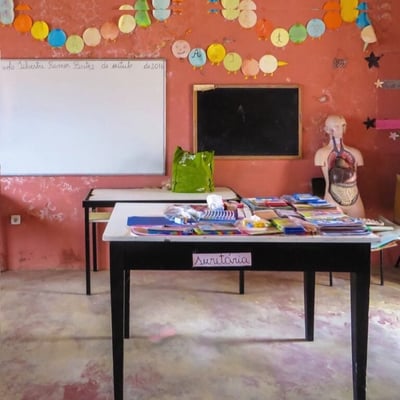1
00:00:03,156 –> 00:00:05,218
Renato: Desculpe, fala português?
{{Renato: Excuse me, do you speak Portuguese?}}
2
00:00:05,726 –> 00:00:06,743
Andressa: Um pouco, sim.
{{Andressa: A little, yes.}}
3
00:00:07,106 –> 00:00:08,982
Renato: Que bom! Pode ajudar-me?
{{Renato: Good! Can you help me?}}
4
00:00:09,436 –> 00:00:09,986
Andressa: Diga.
{{Andressa: Go ahead.}}
5
00:00:10,396 –> 00:00:13,286
Renato: Estou aqui de férias com a minha mulher e as minhas filhas.
{{Renato: I’m here on vacation with my wife and daughters.}}
6
00:00:13,866 –> 00:00:17,494
Chegámos esta manhã e estamos à procura de um sítio para almoçar.
{{We arrived this morning and are looking for a place to have lunch.}}
7
00:00:18,036 –> 00:00:19,256
Aconselha-me algum?
{{Do you have any suggestions?}}
8
00:00:19,816 –> 00:00:22,236
Andressa: Pode repetir mais devagar, por favor?
{{Andressa: Can you repeat [that] more slowly, please?}}
9
00:00:22,466 –> 00:00:26,656
Renato: Estou de férias com a minha mulher e as minhas filhas.
{{Renato: I’m on vacation with my wife and daughters.}}
10
00:00:27,086 –> 00:00:29,635
Procuramos um sítio para almoçar.
{{We’re looking for a place to have lunch.}}
11
00:00:29,886 –> 00:00:32,856
Andressa: Ah! Procura comida típica?
{{Andressa: Ah! Are you looking for traditional (typical) food?}}
12
00:00:33,156 –> 00:00:37,096
Renato: Sim. Um sítio bom e, de preferência, barato.
{{Renato: Yes. A good place and preferably cheap.}}
13
00:00:37,516 –> 00:00:40,437
Andressa: Há um restaurante muito acolhedor junto à Catedral.
{{Andressa: There is a very cozy restaurant next to the Cathedral.}}
14
00:00:40,866 –> 00:00:46,086
Chama-se Tapas Con Gracia. A comida é muito boa e têm música ao vivo.
{{It’s called Tapas Con Gracia. The food is very good and they have live music.}}
15
00:00:46,426 –> 00:00:50,601
Renato: Ótimo. As meninas adoram música. Bons preços?
{{Renato: Great. The girls love music. Good prices?}}
16
00:00:50,986 –> 00:00:54,386
Andressa: Sim. Não é um sítio caro, apesar da localização.
{{Andressa: Yes. It’s not an expensive place, despite the location.}}
17
00:00:54,706 –> 00:00:56,024
Renato: Parece perfeito!
{{Renato: It sounds perfect!}}
18
00:00:56,536 –> 00:01:00,571
Andressa: Tenho a certeza que vão gostar. Mas têm de chegar cedo para arranjar mesa.
{{Andressa: I’m sure you will like it. But you’ll have to arrive early to get a table.}}
19
00:01:00,956 –> 00:01:02,669
É um sítio muito procurado.
{{It’s a very popular place.}}
20
00:01:03,286 –> 00:01:05,092
Renato: Sabe se aceitam reservas?
{{Renato: Do you know if they take reservations?}}
21
00:01:05,536 –> 00:01:06,376
Andressa: Não aceitam.
{{Andressa: They don’t.}}
22
00:01:07,006 –> 00:01:10,693
Renato: Que chato. O melhor é irmos já para lá.
{{Renato: What a bummer. We’d better go there right now.}}
23
00:01:10,986 –> 00:01:11,786
Andressa: Sim, é melhor.
{{Andressa: Yes, it’s better.}}
24
00:01:12,186 –> 00:01:13,624
Renato: Obrigado pela ajuda.
{{Renato: Thanks for your help.}}
25
00:01:13,916 –> 00:01:15,996
Andressa: Não tem de agradecer. Espero que goste.
{{Andressa: You don’t have to thank me. I hope you enjoy it.}}
26
00:01:16,336 –> 00:01:16,986
Renato: Obrigado!
{{Renato: Thank you!}}
 We respect your privacy and have a ZERO TOLERANCE for spam.
We respect your privacy and have a ZERO TOLERANCE for spam.
















Excellente
That infinitive of ir in “O melhor é irmos já para lá” is quite challenging and interesting. It is best “we to go” there now = it’s best to go there now.
Is the infinitive conjugated? So in Portuguese the infinitive is not static like in English where it is always “to go”, but it conjugates to reflect the first, second & third persons singular and plural??
We have two forms of the infinitive: One is impersonal and static, like you said, but there’s also a personal infinitive with different conjugations per person. That’s the one being used in that sentence 🙂 It can be difficult to really grasp where/how it can be used, but here’s a Learning Note that might help: Impersonal vs Personal Infinitive
Just started using these dialogues, finding them very useful. I usually try to listen first without looking at the transcript, and then listen again while reading it to see if I missed anything. One question and a comment: is there much of a difference between the expression ‘Que chato’ and ‘Que pena’, which I think means ‘what a shame’. Also, would it be possible to have maybe one grammatical feature explained in each episode? For instance, here the personal infinitive would be a good one to highlight.
That’s a good way to practice with these shorties! Hope you make good progress.
To answer your question, “Que chato” and “Que pena” are similar expressions. Your translation, “What a shame“, is good. I’m having a hard time explaining the subtleties between them, but I’d say that “Que chato” is a bit more impersonal and focused on the situation (think of it as a shortened form of “Que situação chata” = “What an unfortunate situation“), while “Que pena” relates more to our feelings about it (imagine that the full expression is “Que pena que eu sinto” = “Oh, how sorry I am“).
Also, careful, because “Que chato” or “Que chata” can also be used to call someone annoying 🙂 If you think it may not be clear in context, just change it to “Que chatice“, so that you have a noun rather than an adjective.